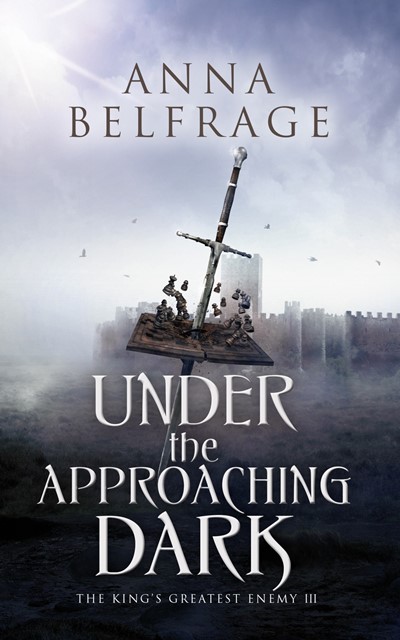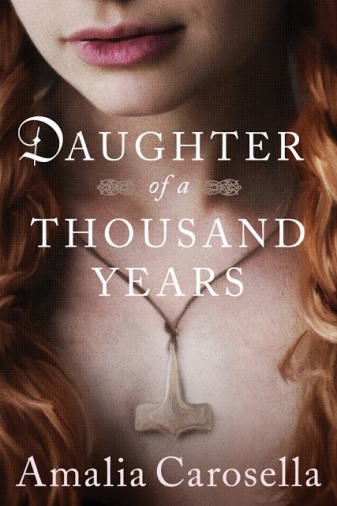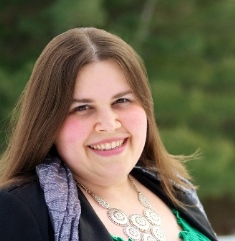
Under the Approaching Dark
by Anna Belfrage
Publication Date: April 28, 2017
Matador
eBook & Paperback; 424 Pages
Genre: Historical Fiction

Adam de Guirande has cause to believe the turbulent times are behind him: Hugh Despenser is dead and Edward II is forced to abdicate in favour of his young son. It is time to look forward, to a bright new world in which the young king, guided by his council, heals his kingdom and restores its greatness. But the turmoil is far from over.
After years of strife, England in the early months of 1327 is a country in need of stability, and many turn with hope towards the new young king, Edward III. But Edward is too young to rule, so instead it is his mother, Queen Isabella, and her lover, Roger Mortimer, who do the actual governing, much to the dislike of barons such as Henry of Lancaster.
In the north, the Scots take advantage of the weakened state of the realm and raid with impunity. Closer to court, it is Mortimer’s increasing powers that cause concerns – both among his enemies, but also for men like Adam, who loves Mortimer dearly, but loves the young king just as much.
When it is announced that Edward II has died in September of 1327, what has so far been a grumble grows into voluble protests against Mortimer. Yet again, the spectre of rebellion haunts the land, and things are further complicated by the reappearance of one of Adam’s personal enemies. Soon enough, he and his beloved wife Kit are fighting for their survival – even more so when Adam is given a task that puts them both in the gravest of dangers.
"The writing is impeccable. The story has everything. Under the Approaching Dark is just perfect in every sense" - Sharon Bennett Connolly, History The Interesting Bits
GUEST POST
No discipline, no output
By Anna Belfrage
First of all, thank you Yelena for hosting me today. I must
admit to being rather in awe of you what with your black belt in karate AND
your writing. I imagine the discipline instilled by your martial arts training
has also influenced your approach to writing, and today I thought I’d write a
bit about discipline—as a balancing quality to the flight of fancy every
writing endeavour contains.
Writing is a very creative process. In the initial stages,
there’s not much discipline around as I’m so caught up in developing the story
I often forget both to cook and shop, causing me to survive on copious amounts
of tea and too much chocolate. This stage is exhausting – productivity is at an
all-time high and I am burning energy as if there is no tomorrow, especially as
I also have a pretty demanding day-job.
Some writers love this part of the process. I don’t,
uncomfortable with the way I am engulfed by the creative side in me. You see,
in all other aspects of my life I am VERY disciplined. I write lists. I plan
dinners a week at the time. I am a structural fascist. Having my brain taken
over by my characters—and a loud and opinionated lot they are—is way out of my
comfort zone, however exhilarating it is.
Fortunately, once the first draft is in place, I can resort
to structure. This is when I rewrite and revise. Historical fiction authors
come in all sizes. For some, the human-interest angle overshadows everything
else, and a couple of historical errors is neither here nor there. For others,
the historical facts must be as correct as they can be. I belong to the latter
category, and my penchant for lists and structure—discipline—come in handy when
I doublecheck my facts. Or when I chase up little details such as on what day
exactly was there a full moon in April of 1328. Or spend hours studying what
medieval maps I can find of the various towns in which my story takes place.
I think this is my favourite phase of the writing process,
lovely hours spent organising my work, comparing my research notes with the
story and the settings. This is also when I discover that perfect scene in
which my heroine is staring out towards the west and the setting sun has to go
as the castle she is in would not offer all that much of a view to the west. I
sigh mightily at having to cut the scene—but pat myself on the back for having
the fortitude to do so. After all, facts are facts.
Mind you, a historical novel without human-interest would be
pretty boring. Especially, if like me, you’re into searing love stories,
intense love scenes and some sort of HEA. So while the
discipline—fact-checking, plot-structure, realistic character arcs, revised
grammar & spelling—build the foundations, it is the creative whimsy, the
actual people, their lives and loves, which make up the icing. And who wants
cake without an icing, hey? Not me, at any rate!
My latest release is set in 14th century England: An inept
king is forcibly deposed and replaced by his young son; the queen mother and
her lover Roger Mortimer take over the actual ruling and the barons of England
don’t like it one bit, to be lorded over by an adulterous wife and her bit on
the side. This is all historical fact, hours of research laying the framework
for the story. A story with plenty of human-interest as it stands, but to
really spice things up I’ve added the fictional character Adam de Guirande,
torn between his love for his young king, his former lord Mortimer—and his wife.
The end result is (I hope) quite the heady brew of medieval
intrigue, treachery and passion. But it is the disciplined approach to
historical facts and trivia that help build the setting and atmosphere. It is
through discipline that I build my medieval world, lacing it with sufficient
details to transport the readers right into the draughty guest hall of the
Priory of St Mary, one very cold December day in 1327.
It had been decided that the former king was to be buried at
St Peter’s Abbey in Gloucester. Some days into December, the court was slowly
making its way across a sodden and gloomy England, the king preferring to ride
apart with his young companions.
They arrived in Worcester in a squall of rain and sleet. Kit
had never entered Worcester from the east before, having always approached from
the west and over the bridge spanning the Severn, but once through the gate,
the town was very much as she remembered it—albeit surprisingly empty of
people, which she took to be due to the freezing weather. They made their way
towards the river and the huge whitewashed church of the priory of St Mary’s,
stark against the grey skies beyond. By the time they were ushered inside the
priory’s guest hall, they were muddy and cold to the bone.
Kit settled herself in a corner, waiting for the bustle to
settle. The queen insisted on private accommodation, and the little prior bowed
and scraped, hands twisting nervously as he assured his lady queen he would do
everything to fulfil her wishes.
Kit pulled her damp cloak closer and suppressed a shiver.
“Cold?” King Edward sat down beside her.
“And wet.”
So was he, his hair plastered to his head. A day of constant
wind and rain had left him with windburn, he had a streak of mud under his
right eye, and his boots squelched when he moved. And yet it wasn’t that which
moved her to place a hand on his face—it was the shadows under his eyes, the
uncertain set to his mouth.
“It will be over soon, my lord.”
“Will it?” He pulled off his gloves, rubbing his hands. “I
am not so sure, Lady Kit.” He scraped at a scab on his hand, studying the
little beads of blood intently.
“Once he is laid at rest, things will be easier.” She used
her sleeve to wipe his hand clean of blood.
Edward grunted, no more, sinking into a heavy silence. Kit
cast about for a somewhat cheerier subject.
“Looking forward to
your wedding, my lord?”
The king blinked. “My wedding?” His mouth curved into a soft
smile, and he nodded. “She will be on her way soon.” He gnawed his lip,
throwing Kit a look from under long, fair lashes. “I hope she is as pleased as
I am.”
“Oh, I am sure she is.”
“Truly?” He smiled again, briefly. He made as if to say
something, broke off. Kit waited. “I…” He turned troubled eyes on Kit. “I have
never…er…deflowered a maid.”
“I am glad to hear that,” Kit said, laughing silently at his
discomfited expression.
“Will I hurt her? I don’t want to, but Montagu says it
always hurts the first time for a woman.” He leaned back against the wall, long
legs extended before him.
“It doesn’t have to.” Kit recalled her own wedding night. It
had been uncomfortable as Adam had been convinced she was no virgin. But he had
made amends, loving her with far more tenderness the second time around.
“Lady Philippa will have been told two things: that it may
hurt, and that she must lay back and bear it—as any good wife must.” She rubbed
at her belly. In response, the child within kicked. “If you want a happy
marriage, you don’t want her to lay back and bear it, my lord. You want her to
enjoy it.” From the amused look in the king’s eyes and the heat in her cheeks,
Kit suspected she was presently the bright red of rowan berries, but she pushed
on. “You must…well, I suppose you have to…” She glared at him. “Why don’t you
ask Adam instead?”
“He’s not a woman.” The king studied his hands. “I have to
touch her, don’t I?”
He cleared his throat. “Everywhere.”
“Yes.” Kit fiddled with the clasps of her cloak. “Touch her
and kiss her until she strains towards you.”
“What if she doesn’t?”
“Then you’re not touching her boldly enough.”
The king grinned. “Can I hope for some demonstrations, Lady
Kit?”
“Most certainly not!” She stood. “If you want further
guidance, I suggest you ask someone else.”
“Like Adam.” Yet again that broad grin. “He must do
everything right, to judge from your bright face, my lady.”
Kit grinned back, patting her belly. “As a matter of fact,
my lord, he does.”
Thank you Anna, for the great post!
About the Author

Anna was raised abroad, on a pungent mix of Latin American culture, English history and Swedish traditions. As a result she's multilingual and most of her reading is historical- both non-fiction and fiction. Possessed of a lively imagination, she has drawers full of potential stories, all of them set in the past. She was always going to be a writer - or a historian, preferably both. Ideally, Anna aspired to becoming a pioneer time traveller, but science has as yet not advanced to the point of making that possible. Instead she ended up with a degree in Business and Finance, with very little time to spare for her most favourite pursuit. Still, one does as one must, and in between juggling a challenging career Anna raised her four children on a potent combination of invented stories, historical debates and masses of good food and homemade cakes. They seem to thrive…
For years she combined a challenging career with four children and the odd snatched moment of writing. Nowadays Anna spends most of her spare time at her writing desk. The children are half grown, the house is at times eerily silent and she slips away into her imaginary world, with her imaginary characters. Every now and then the one and only man in her life pops his head in to ensure she's still there.
Other than on her website,
www.annabelfrage.com, Anna can mostly be found on her blog,
http://annabelfrage.wordpress.com – unless, of course, she is submerged in writing her next novel. You can also connect with Anna on
Facebook,
Twitter and
Goodreads.







